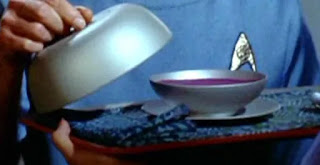Series: Star Trek: Voyager
Season 1, Episode 14
Original Air Date: May 8, 1995
 |
| via Wikipedia |
Torres, Paris and Lt. Durst are all captured by Vidiians, the organ-harvesting species we first met in "Phage." As if that weren't trouble enough, B'Elanna has been split into two beings: one representing her Klingon side, the other her human side. Can the rest of the Voyager crew rescue them and return Torres to "normal?"
We have important matters to discuss.
On the surface, "Faces" is certainly a compelling story. The prison escape narrative is fine. The Torres character exploration is meaningful, for both the audience and the actor. But this latter tale reveals deeper issues - with the character, with Star Trek, indeed with the typical attitudes of white America in the 1990s and beyond. For all of Trek's tolerance preaching, the franchise is not immune to falling in the same racial pitfalls everyone else does. It's something I've danced around with Star Trek for a while. It's time to take a deeper dive.
Before I dig in, I must acknowledge that I am a middle-aged white man. While it's essential I confront racial issues - racism is a white problem, not a POC problem - it's also important to share the perspectives of people of color. To that end, I highly recommend two articles:
In particular, let's examine Star Trek's portrayal of biracial characters, a central element of the saga from the beginning. It all starts with Spock, half-Vulcan, half-human. As Haruch discusses in his article, Spock is the main principal through whom we explore the concept of otherness. Uhura and Sulu are both significant for racial representation but the writers devote zero material to the experiences of either as an African or an Asian among what is still predominantly a white crew. With Spock on the other hand, we often see prejudices laid plain, even with Kirk and McCoy who are meant to be his friends.
The duality of Spock's racial identity - feeling simultaneously both and neither - is certainly something many biracial people in the real world wrestle with every day. So, too, the desire to suppress one identity in favor of the other depending on the circumstances is very real for some. Indeed, Star Trek probably deserves a lot of credit for exploring such a taboo issue. In 1966, when the show began, interracial marriage was still illegal in much of the United States. So Trek is firmly on the correct side of history, right?
To a point.
B'Elanna Torres is a problematic character and "Faces" provides an excellent demonstration of why. She loathes her Klingon side. At several different points in the story, she makes clear she wants to be rid of it. Throughout, the Klingon Torres is violent, impulsive, manipulative, animalistic. The human Torres is, while scared and submissive, also smart and level-headed. For each, the counterpart is seen as a burden. Clearly, we are meant to sympathize with her human half and the death of the Klingon half feels like more than just long-term narrative convenience.
In the end, the Doctor restores Torres to the way she was, both human and Klingon DNA intact, not because she wants it - she clearly doesn't - but because it's necessary to keep her alive.
In the article linked above, Maestro examines Torres as a literary archetype known as the "tragic mulatto," first established by abolitionist Lydia Maria Child in two short stories she wrote in the 1840s. Maestro updates the term as "tragic hybrid." According to Maestro, tragic hybrid characters are "usually women, and tend to be troubled, outcast, unlucky, lonely, perverse, and often die untimely or suicidal deaths." That sounds an awful lot like B'Elanna.
Now back to Spock. True, he is proud of his Vulcan identity, even favoring it over his human side. However, it's equally clear that everyone else on the ship would prefer him to be more human. Even in Kirk's touching eulogy for his friend in Wrath of Khan, he describes Spock as the "most human" soul he has ever encountered. This is intended as the highest compliment from Kirk, from Starfleet, from the franchise, from the audience.
Unfortunately, this is the message we see in Star Trek rather often. Differences are all well and good but it really would be better if you were more like us. It was the message with Spock, with Data, with Worf and many other characters and species. If you don't think that paralleled racial attitudes in the time these shows were made, you're kidding yourself.
I graduated from college in May 1995. I remember the typical white perspective. Diversity is fine - even wonderful, often fetishized (which is not the same as acceptance). But assimilation is better. Of course, that's awfully tricky when physical differences are obvious. But that's on you. Try harder. Be whiter than white people. Be better than us. Because anything else isn't good enough.
And things haven't changed much since.
Does everyone feel that way? Of course not - at least not consciously. Indeed, many are horrified if and when their own unconscious racism is pointed out to them.
Is it fair to expect Star Trek, a mere TV show, to be better than the rest of society? You're damn right, it is. They took on the challenge themselves in 1966. The entire premise is predicated upon a better, more tolerant future. If we as the audience believe in that future, we have to hold both the creators and ourselves accountable to it.
Food Notes
On a lighter note, the first act begins with Neelix serving a bowl of plomeek soup to Tuvok in the mess hall. Neelix intends to research home world comfort meals for every member of the crew. It's a worthy goal, though Tuvok is unimpressed by his creation. Evidently, plomeek soup is meant to be bland and Neelix's version is quite spicy. I expect I would prefer Neelix's version.
 |
| via Memory Alpha |
Plomeek soup first appeared in the original series episode "Amok Time." Predictably, there are numerous recipes online.
Acting Notes
 |
| via Supernatural Wiki |
Rob LaBelle plays a Talaxian prisoner who helps our friends to escape. It's fun, at this point in the season, to see a Talaxian other than Neelix. This is his first of three Star Trek appearances. LaBelle was born in Minneapolis, Minnesota, August 2, 1962. He had a principal cast role on First Wave. Films include Wes Craven's New Nightmare, Jack Frost and Watchmen.
This post makes us think and provokes us! I'm white and I feel that I'm not well accepted by the society where I live because I don't belong to the stereotype of a married woman with children! We only truly accept others if they behave like the majority. I feel it's like that with people of other races, I've made a self-portrait of myself in which my colour is that of a black person. Thanks for this post, there's still a long way to go!
ReplyDeleteSexism runs deep in Star Trek, too. I'm sure I'll get to that another day.
DeleteAs you probably know, the unreasonable expectations of women have been an issue in our Presidential election.
Yes, I truly see your points and, yet, for its time it is still ahead of the game and makes us think. Today, this same episode would be written differently so we must look at these episodes from. The mind of 30 yrs ago. Think, back in the eps it was considered a compliment when Fred Astaire went black face to honour Bill " Bojangles"Robinson. If we view it with our knowledge today, people would love to censor that and yet that would be horrifying. I hate censorship, Fred Astaire asked Bill if he could do this and Bill was honored! . Fred Astaire meant nothing but high esteem not belittling. Today, All In The Family and The Jeffersons would never be made which is a shame.
ReplyDeleteI agree that it's complicated. I still think in 1995, they should have known better.
Delete